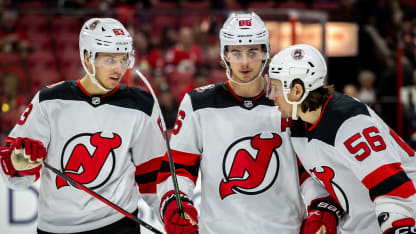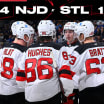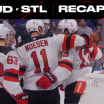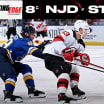Experience is the best teacher.
But in the absence of experience, how does one prepare for what lies ahead? That's a question the Devils will be tackling when they open their 2023 Stanley Cup playoff First Round matchup against the New York Rangers Tuesday night at Prudential Center.
There are 24 players on the Devils current roster. Of those 24, 10 would be making their NHL playoff debuts, while five have played five or less postseason games in their respective careers.
Forwards Nathan Bastian, Jesper Boqvist, Jack Hughes, Michael McLeod, Dawson Mercer and Yegor Sharangovich, defensemen Kevin Bahl and Luke Hughes and goaltenders Mackenzie Blackwood and Akria Schmid have never appeared in a postseason game.
Nico Hischier (5 games), Miles Wood (5), Damon Severson (4) Jesper Bratt (1) and Vitek Vanecek (3) have garnered some experience.
But when it comes to the playoffs, talk can be cheap. There will be a lot of learning on the fly for these neophyte Devils.
Neophyte Devils to Learn on the Fly | FEATURE
The Devils have 10 players on their roster that have never played in a playoff game

"I don't think so," head coach Lindy Ruff said regarding whether or not you can prepare someone for their first playoff game. "You have to experience it.
"We've talked about what it's going to be like. … It's focusing on our game and what we do well. We're not going to run around and change a bunch of stuff. We're going to have to be able to play our game."
Communicating that to the younger players will fall on the shoulders of veterans like Ondrej Palat (138 playoff games), Erik Haula (61), Brendan Smith (56) and Dougie Hamilton (54).
"If you can help them understand it's nothing like they've ever experience," Smith said. "The level jumps up that much more. What I've been preaching, you can give them the preparation, so they're not caught off guard. But then it's all about trial and error."
How different is the playoffs from the regular season?
"It's the energy. Some of the desperation. The intensity of the game is ramped up," said Ruff, who has coached in 120 postseason games in his career. "It's really just a different ballgame."
There are two major differences that filter their way throughout the entire game.
One, in the most relative terms, the effort from every player is intensified. Over the course of an 82-game season, there will times and shifts where a player isn't going at full speed. Those days are gone.
Offensively, the consequence of that is the extra second or split second of time that existed in the regular season is gone. The other consequence is that that the little bit of extra space and open ice some players are accustomed to will either evaporate more quickly or may not exist at all.
Thus, it will be a battle to gain every inch of ice. Doubled with that, decisions must be made faster and executed quicker.
"There's a regular-season level and there's a playoff level," Ruff said. "We know that everybody has to get out of their own level to be able to win in the playoffs. The first round is a battle of will. Players that don't normally hit start hitting."
"We can talk about how hard it is," said veteran forward Ondrej Palat, whose 138 playoff games account for 28.8 percent of the team's total playoff experience (479 games). "It's going to be a lot of hitting and a lot of details we need to do, like turnovers and stuff. The guys need to experience that."
Defensively, with opposing players making faster plays and all-out effort, the Devils will have less time to read and react to unfolding situations in the D zone. Anticipation and closing gaps take on even more importance.
"A lot of times it comes down to a matchup. Either coach is matching up their players whether you're home or away," defenseman Brendan Smith said. "You get matched up and then you have to win your match up. That's how you go into that. You try to win your match up on that night."
Another factor will be the extra chipping that sometimes takes place in the postseason. Players throw a little extra "obstruction" into their games. A little shoulder rub here, a little impedance there, a little pick-play here. And many of those penalties that get called in the regular season become less frequent.
Young players have to fight through that frustration and play smart. Patience, as they say, will be a virtue.
"I think the mental part is more prolific than the physical side," said forward Curtis Lazar, who's played 24 playoff games. "You have to be patient. Can't chase the game. Take it shift by shift.
"If you try and do too much because the moments big and you want to be the guy and it backfires, just chip away. Take what's given to you. Wait for those mistakes, capitalize."
Also, dealing with the intensely emotional highs and lows of the playoffs will take some mental fortitude.
"I remember feeling after we won a game that we were going to win the Cup," Lazar said. "And after losing a game that we were done, and the other team has us figured out. Finding a medium is what you need."
"We've done a great job of staying in the moment of not getting too high and not getting too low," Ruff said. "Just enjoying that moment and wrapping your arms around it."
Palat echoed that sentiment in his conversations with younger players.
"The one thing I told them was to enjoy the moment. Now we're in it," said the two-time Stanley Cup champion. "We can win a Stanley Cup or they can win a Stanley Cup. Regular season you battle for the playoffs. In the playoffs you can win a Stanley Cup and that's a huge opportunity."
One thing the young players know for sure is what to expect - even though they don't know what to expect.
"I don't have all the answers. I have zero playoff games to my name," Jack Hughes said. "I'll learn and hopefully we can go on a deep run this year and hopefully I get a lot of playoff games in my career.
"I had a really good year. Now it's just a different season. It's time for playoffs. It's going to be more difficult, and the stakes are going to be higher."


















